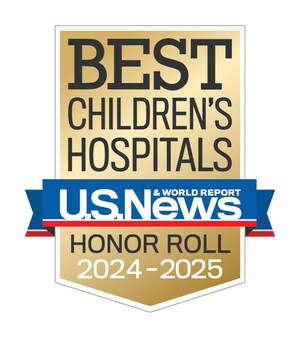Seattle Children's shares results of national study tracking cognitive development of children with craniosynostosis
Study found children with craniosynostosis averaged lower scores on standardized tests, but majority showed no discernible learning problem
SEATTLE, Feb. 23, 2015 /PRNewswire/ -- Seattle Children's researchers led a 10-year, multi-site study tracking the cognitive development of children with single-suture craniosynostosis from infancy to school age. The study, published today by the American Academy of Pediatrics and titled "Intellectual and Academic Functioning of School-Age Children with Single-Suture Craniosynostosis," reported children with single-suture craniosynostosis, on average, were more likely than children without the disorder to have learning deficits once they started school. However, despite this trend, a little over half of the children with single-suture craniosynostosis showed no discernible learning problems.
"Although developmental delays observed among infants with single-suture craniosynostosis were partially evident in elementary school, our results provide more good news than bad for parents," said Dr. Matthew Speltz, a clinical psychologist in Seattle Children's Craniofacial Center, principal investigator at Seattle Children's Research Institute's Center for Child Health, Behavior and Development and lead author of the study. "On average, the children with single-suture craniosynostosis experienced mild cognitive and academic deficits, and most of them were doing pretty well in early elementary school."
Researchers also discovered developmental delays varied significantly based on the subtype of craniosynostosis. Children with metopic, unicoronal or lambdoid synostosis were much more likely to have a learning problem than children with the most common form of single-suture craniosynostosis – sagittal synostosis. In related research, Speltz and colleagues also found that boys with single-suture craniosynostosis tended to score lower on academic and IQ tests than girls with this condition.
"This information helps us determine which children are at greatest risk of falling behind," Speltz said. "This will enable us to better target children with single-suture craniosynostosis for early screening and intervention programs that prevent or minimize cognitive and academic difficulties later in life."
Speltz's study is the first multi-site study to track the development of children with single-suture craniosynostosis and unaffected controls from infancy to school age. Researchers compared the developmental status of 182 school age children with single-suture craniosynostosis and 182 unaffected children using standardized tests of intelligence, reading, spelling and math.
The children with craniosynostosis averaged lower scores than the control group on all measures. The largest observed differences were in full-scale IQ and math computation. The smallest differences were observed in reading and spelling. Still, most children with craniosynostosis performed well academically and 58% had no discernible learning problem.
Neurodevelopmental impairment has long been suspected among children with single-suture craniosynostosis. The prematurely fused suture is believed to constrain or alter brain structures and increase intracranial pressure. In recent studies, including one from Australia, infants and preschoolers with single-suture craniosynostosis have consistently scored lower, on average, than same-aged children without this condition. Speltz initiated this study to determine if these delays persisted into the school-age years and manifested as learning disabilities. Few neurodevelopmental studies have focused on children with single-suture craniosynostosis beyond age 3, and most have lacked control groups or used methods other than testing to estimate developmental progress.
"There have been clinical impressions and hypotheses about the cognitive status of children who've had single-suture craniosynostosis, but kids with this disorder have never been studied longitudinally in order to see how they develop over time and how they compare to unaffected children over the same time period," Speltz said. "Understanding the cognitive development of these children is important so we know which children are at greater risk of developing learning disabilities and how we can intervene early in their lives to make a difference."
Single-suture craniosynostosis is defined by the premature fusion of any one of the cranial sutures and occurs in approximately one in 1700-2500 live births. Corrective surgery to restore the suture is preferentially performed in the first year of life. Seattle Children's Craniofacial Center is an international leader in treating craniosynostosis, performing more than 80 primary surgeries and coordinating care for 300 families each year.
Other Seattle Children's collaborators on this study include Dr. Michael Cunningham, medical director of Seattle Children's Craniofacial Center and investigator in Seattle Children's Research Institute's Center for Developmental Biology and Regenerative Medicine, and Dr. Brent Collett, clinical psychologist in Seattle Children's Craniofacial Center and investigator in Seattle Children's Research Institute's Center for Child Health, Behavior and Development.
About Seattle Children's
Three simple words define Seattle Children's Hospital, Foundation and Research Institute – Hope. Care. Cure. Together, the three deliver superior patient care, advance new discoveries and treatments through pediatric research, and serve as the pediatric and adolescent academic medical referral center for Washington, Alaska, Montana and Idaho – the largest region of any children's hospital in the country.
Consistently ranked as one of the best children's hospitals in the country by U.S. News & World Report, Seattle Children's Hospital specializes in meeting the unique physical, emotional and developmental needs of children from infancy through young adulthood. For more than 100 years, the hospital has been dedicated to providing top-quality care to every child in who needs it, regardless of the family's ability to pay.
Seattle Children's Hospital and Research Foundation gathers community support and raises funds for Seattle Children's Hospital and Seattle Children's Research Institute.
Located in downtown Seattle's biotech corridor, Seattle Children's Research Institute is pushing the boundaries of medical research to find cures for pediatric diseases and improve outcomes for children all over the world. Internationally recognized investigators and staff at the research institute are advancing new discoveries in cancer, genetics, immunology, pathology, infectious disease, injury prevention and bioethics, among others.
For more information, visit seattlechildrens.org or follow us on Twitter or Facebook.
SOURCE Seattle Children’s
Related Links
WANT YOUR COMPANY'S NEWS FEATURED ON PRNEWSWIRE.COM?
Newsrooms &
Influencers
Digital Media
Outlets
Journalists
Opted In





Share this article